Search Images
Browse Content (p. 1239)
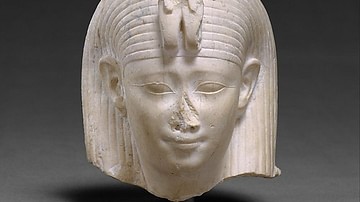
Image
Arsinöe II
This limestone statue dates to 278-270 BCE and was found in the Memphite region of Egypt. Thought to portray the Ptolemaic queen Arsinöe II, the piece is an obvious callback to earlier Egyptian artistic motifs in an attempt to legitimize...

Image
Mahram Bilqis
The greatest temple in Saba – known as Mahram Bilqis, near the capital of Ma'rib, in modern-day Yemen – was dedicated to Almakah and was revered as a sacred site in the region long after the Sabean Kingdom itself was gone.

Image
Ma'rib Dam
Remains of the Ma'rib Dam, in modern-day Yemen. The oldest known dam in the world, blocking the ravine of Dhana (the Wadi Adanah), it was built under the reign of the Sabean mukarrib Yatha’ Amar Watta I (c. 760-740 BCE). It failed in c. 575...

Image
Shivta
The ruins of Shivta, ancient Nabatean trade center along the Incense Routes, in modern-day Israel.
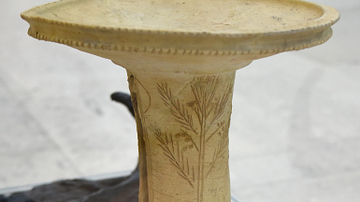
Image
Ceramic Stemmed Dish from Ur
This offering stand has a hollow trunk with two long vertical slots at the sides. There is an incised decoration around the stem, typical of Sumerian art; plants indicative of fertility and doorposts found on temple facades and in religious...
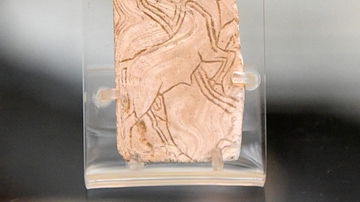
Image
Prancing Bull from Tell al-Ubaid
This plaque of Sumerian decoration was probably used for wooden items, such as furniture or fine musical instrument. From Tell al-Ubaid, Southern Mesopotamia, modern-day Iraq. Early Dynastic Period, 2600-2500 BCE. (The British Museum, London...

Image
Calcite Statue of a Mesopotamian Man
Calcite figure of a man, with a cuneiform inscription on the right shoulder/upper arm. The text hasn't been deciphered yet, but probably it bears the dedicator's name. The nose might well have been attached separately. There is a cuneiform...
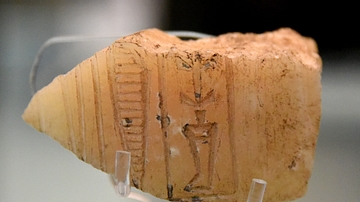
Image
Fragment of Stone Jar Inscribed with the Name of Rimush
This small fragment came from a large upright stone jar. The jar was inscribed with the name of the Akkadian king Rimush, son of Sargon. Akkadian Period, reign of Rimush, 2278-2270 BCE. From Ur, Southern Mesopotamia, modern-day Iraq. (The...

Image
Face of the Demon Humbaba
Face of the demon Humbaba (Huwawa), a monster featured and slaughtered in the Epic of Gilgamesh, from Sippar, Southern Mesopotamia, modern-day Iraq, Old Babylonian Period, 1800-1600 BCE. This example of his features was used in the interpretation...
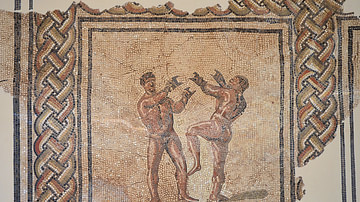
Image
Roman Boxer Mosaic
A mosaic fragment depicting two boxers with oddly shaped boxing gloves, 300-350 CE. The gloves have sometimes been interpreted as having metal spikes attached to them but they are more likely gloves with separate slots for fingers. (Rheinisches...